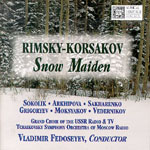The Snow Maiden was premiered in 1882 to great acclaim throughout Russia. Its success is easily contemplated; after all, it’s based on one of the most popular Russian fairy tales (Tchaikovsky composed incidental music for another stage version). The music, an amalgamation of folk, religious, and “oriental” elements, is tuneful and quite beautiful, with very lyrical vocal lines, even if it sounds a bit foursquare given its phantasmagoric subject matter (it’s to the later operas like Le Coq D’or that we must turn for the magical and mystical Rimsky). The Snow Maiden’s plot is surprisingly (or maybe unsurprisingly) similar to that of Dvorak’s Rusalka. Snegurochka (the Snow Maiden) is a winter weather spirit who defies her parents’ warnings and ventures into the world of mortals, subsequently falling in love with a Shepherd named Lel. Lel, however is love with Kupava, who is engaged to marry Mizgir, a tartar. Snegurocha arouses in Mizgir such a great passion that he deserts Kupava, an act for which he is arrested and brought before the Tsar. Snegurocha, bewildered by the ways of the human heart, returns to her mother, who grants her the power of human love. But, as soon as she voices her love to Mizgir, she is turned into vapor by a ray of sunlight. (What a bummer!)
Valentina Sokolik brings a beautifully sinuous voice and deeply felt emotion to the title role. Irina Arkhipova almost steals the show with her dramatic Act 2 scene in which she tells the Tsar of her broken heart from Mizgir’s betrayal. Anton Grigoryev’s lyric tenor lends a kind edge to the Tsar’s authority, and Anatoly Moksyakov’s bracing baritone well embodies the proud, strong Mizgir. The USSR Radio & TV Grand Choir sounds grand in every sense of the word, providing full-throated, Slavic-tinged singing. The Tchaikovsky Symphony Orchestra plays in that wholly Russian style, with plenty of power and brilliance. The whole project is lead with a sure and sensitive hand by Vladimir Fedoseyev, who is more animated here than on some of his purely orchestral recordings. The recording, from an original Russian source, is somewhat hard-edged and lacking in warmth, but the balances are true and the voices project with satisfying clarity. It will be interesting to see if Valery Gergiev gets around to this work in his Rimsky-Korsakov series for Philips; but until then, this is a must-have for Russian opera aficionados. [5/19/2001]
































